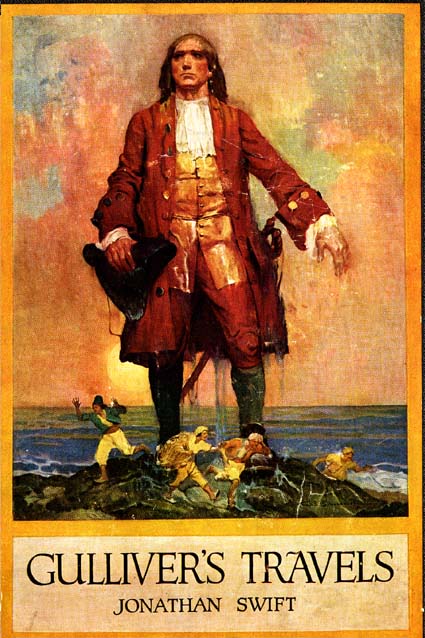Ireland with Jonathan Swift's Gulliver's Travels
The tragedy of Jonathan Swift’s legacy is that his most famous work Gulliver’s Travels has been immortalised by the woeful Jack Black film adaptation. Don’t mention this atrocity to the Irish. They rankle at the merest mention. They also pronounce ‘film’ using two syllables: /fil-um/ but that’s another issue.
Gulliver’s Travels is undeniably odd.. On surface level, it’s the story of Gulliver who finds himself visiting strange lands, where he is a giant, another where he is miniscule, and another where talking horses reign. He manages to escape back home each time, and swears that he will never leave the safety of home again. Later that day, he sets out from the safety of home, and ends up somewhere more bizarre than the previous trip.
But in reality, the story is a lot deeper than it seems. It is actually a satire of human nature, and Swift is questioning how people become corrupted and do bad things to one another. And here is why you must read it whilst in Ireland. It is a nation still in chaos. The tension between Britain and Ireland is still very real. The IRA may be gone, but the struggle remains. Belfast is still a city split down the middle by a wall as figurative as it is literal. The kind of beer or whiskey they sell in a pub indicates whether it’s English or Irish. And you wouldn’t be caught dead in the wrong kind of pub.
This was already an issue when Swift was writing in the 17th century. His previous work sarcastically recommended to his people that they kill and eat their children at 12 months old, because the English were treating the Irish like animals, and so the they ought to be eaten as such. It’s sarcasm is disturbing. As are the recipes he provides in graphic detail. Explicitly pointing out the mistreatment from the English would have had him killed. And possibly eaten.
Although Gulliver’s Travels takes place in a fantasy world the concerns about oppression and human unkindness which Swift is investigating is just as tangible in Ireland today. Ultimately, it’s easy to read, wildly imaginative and causes you to think hard about humanity.
If you missed all this from Jack Black’s film, that’s not your fault.
-Tim Clarke
"Every man desires to live long, but no man wishes to be old."

